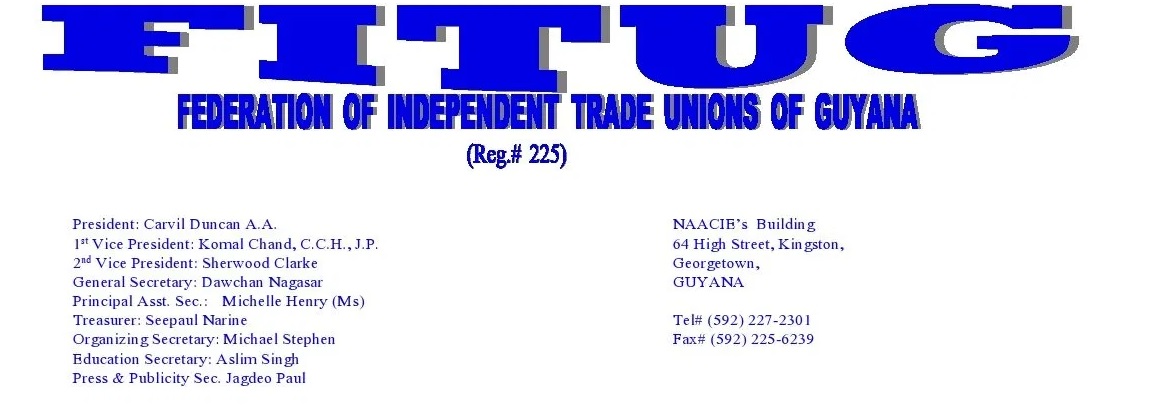The Federation of Independent Trade Unions of Guyana today flayed the government over the 2016 deal with an ExxonMobil subsidiary saying that recent revelations on it by the NGO Global Witness were disturbing and the buck stops at President David Granger.
A statement from FITUG follows:
Guyanese people must live with painful consequences of oil giveway
The Federation of Independent Trade Unions of Guyana (FITUG), which speaks on behalf of thousands of Guyanese working families, could not help but feel deeply disturbed after it considered the examination of our nation’s oil agreement by the overseas-based NGO Global Witness. The report which is aptly titled “Signing Away”, in our view, puts into perspective what our nation and, more so, current and future generations of our people have really lost.
Many commentators, analysts and experts had previously decried the arrangements regarding commercial oil extraction. We recall too that even the IMF had warned that Guyana had gotten … the short end of the stick. Of course, the newly-released report has now provided the context which has bound our nation to such a lopsided arrangement. We saw too that the NGO has expressed concern regarding the aggressive, and maybe tempting, negotiation tactics by ExxonMobil to reach the agreement it ultimately got. While the actions of the oil company may well be considered improper, we contend that at the end of the day, it was, like all profit-maximizing enterprises, seeking to obtain the best deal it could for its shareholders.
In such circumstances, we are of the strong view that the Granger Administration had a bounden, and we daresay a fiduciary, duty to its shareholders – the Guyanese people. Clearly, from the report, the Administration dropped more than the ball successively regarding the discussions on a new agreement. We recognised that a fair share of finger pointing has been directed towards Natural Resources Minister, Raphael Trotman who, it appears, was very much in over his head. While Minister Trotman, we believe, must accept a fair share of responsibility for what has been signed away, at the same time, the buck stops with President David Granger who has an equal, if not greater, responsibility for what we are now bound to. We hold that the Administration had a collective responsibility to ensure that the interest of Guyana and Guyanese were foremost. Upsettingly, they have collectively failed in this critical responsibility and it is our people who must now swallow the painful consequences. No amount of varnishing could erase this noteworthy stain and seeming sin.
What was disparagingly disturbing for us was that we apparently held all, if not most, of the cards yet rather than maximizing our interest, we choose to squander it away ostensibly for stays in high-priced hotels, dining in fancy restaurants, and limousine travels. What is disheartening about this is that such practices have been documented before and yet we went in, with eye wide open, and swallowed it all, hook, line and sinker.
The US$55B loss we suffered was described by the Stabroek News in its February 03 editorial as “mind-boggling” and equivalent to “…26 times the highest ever external debt of the country”. It tells us vividly what was at stake and what has been essentially and flippantly signed away. Such a stupendous sum, once properly utilized, could have meaningfully dented the poverty situation, accelerated our development thrust, closed our infrastructure deficits and advanced our knowledge economy.
At the end of the day, it is clear that the Guyanese nation and people have lost. Our national wealth has been sold very cheaply and, seemingly, without any consequence to those who have put us in the pit we now find ourselves. This is hardly the characteristic of individuals who would exude patriotism and peoples-first orientations. It should not miss us too that oil, based on current discoveries, has a limited shelf life. Expectedly it will be with us for only four (4) decades but, of course, our nation and people will have greater needs beyond then. It was, therefore, important that we received maximum return for our patrimony and rather than the fanfare of first oil we should seriously begin to focus on life after oil.










